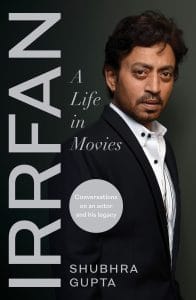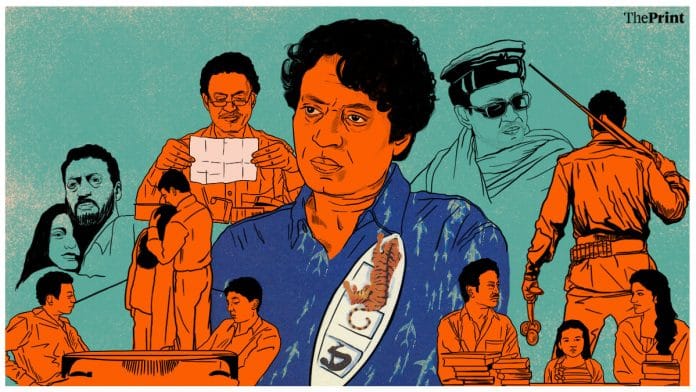Nahi karoonga kahaani poori. Aadhi chhod jaaoonga beech mein.
I will not complete the story. I will leave it halfway.
– Madaari, 2016
Some lines are prescient. On 29 April 2020, Irrfan Khan left his story halfway. In his passing, the world lost an actor nonpareil.
This was not the way it was meant to be. His journey was one of a kind – from television in the late eighties and nineties to his first steps in cinema in the new millennium; his gradual climb from bit parts to lead roles written solely for him; from films that were on the fringes of Hindi cinema to moving front and centre, all the while challenging, slowly but surely, the definition of the mainstream, and of stardom.
Irrfan gave us unalloyed joy, the kind only a true performer can. In his best roles, you could not see Irrfan. What you got instead was the character, full-bodied, believable, built with the exquisite awareness of the self and the other. These were parts which had provenance, a rare quality in Hindi cinema. When we meet characters essayed by Irrfan, we implicitly become aware of their histories – and some of those characters walk out with us when the film ends.
There is no doubt that he was an actor who filled us with pleasure. But was Irrfan a star? He made us grapple with this question much more seriously than anyone who came before him.
This was not, and is still not, a rhetorical question. Mainstream Hindi cinema thrives on the star–actor binary. Most stars rely upon their charisma to get the job done. Unlike such stars, great actors are not automatically offered great movies which have the potential to go big; that space is still a work-in-progress, but Irrfan gave it an unparalleled boost.
Whether they are from Hollywood or Bollywood, stars tend to choose films that ride on their stardom and burnish it. Stars do starry stuff; their ‘market’ mandates it. Experimenting with their ‘image’ isn’t something risk-averse mainstream film industries veer towards. What if die-hard fans turn their back on the film and it turns into a resounding flop? True actors like Irrfan, on the other hand, gravitate towards films which give them a chance to hone their craft, spread their wings, explore yet another facet of life through story and performance.
With each film, Irrfan was pushing boundaries. He was creating a space for himself, filling it with the enticements that got people to buy a ticket for an ‘Irrfan film’, and there came a time when Irrfan blurred the lines between actor and star – another of those rarities in Hindi cinema.
Once you get there, you change something. You are no longer confined to films made on a small canvas. Big producers are willing to take a punt on you because you bring the crowds in. You become a boon for smart screenplay writers, who are always looking for opportunities to create something original. It’s a win-win.
The last actor who managed to do this was Amitabh Bachchan. And before that, to some extent, Dilip Kumar. Consummate actors, towering stars, their films had huge cultural footprints. They changed the script, the groundswell of opinion and, as a consequence, the industry. The three Khans – Aamir, Salman, Shah Rukh – who grabbed our attention during the end of the eighties and the early nineties (when Irrfan, stuck in his TV rut, was struggling to break into the movies) became superstars before they could start shifting a few registers here and there.
But Irfan Khan, who added an ‘r’ to his first name and dropped his surname, worked to ensure that he was no prisoner of any image. Singlehandedly he lifted the status of ‘character actors’; he became that actor who made us fall in love with his characters. He managed to do the near-impossible – create a magnetic hold over his audience despite being a chameleon. He could become anybody, and he could keep us watching.
When he was diagnosed with an incurable endocrine cancer in 2018, it must have been a cruel blow, as he was, at that time, right on top of his game. He had breached the box-office barrier, finally, with his 2017 dramedy Hindi Medium, breaking into the so-called ‘100-crore club’. With that, he was finally the actor who could ‘open’ a Friday. That was all it took for big-studio Bollywood – which keeps a sharp eye on the films that make money – to fully wake up to him. If he could do this with a film which had a distinctly indie spirit, what would he have achieved if given a bigger budget, bigger play, and the promise of a big opening?
If he was still around, Irrfan would have changed the rules of the game.
There was no one quite like him. As we mourn his loss, and feel his absence keenly, it’s becoming quite apparent that there may never be. Sure, there are superlative actors in the Indian firmament, but someone like him, who held within his self a multitude of selves, and presented them with great empathy and assuredness, may be hard to find.
 This excerpt from Shubhra Gupta’s ‘Irrfan: A Life in Movies’, has been published with permission from Pan Macmillan India.
This excerpt from Shubhra Gupta’s ‘Irrfan: A Life in Movies’, has been published with permission from Pan Macmillan India.






